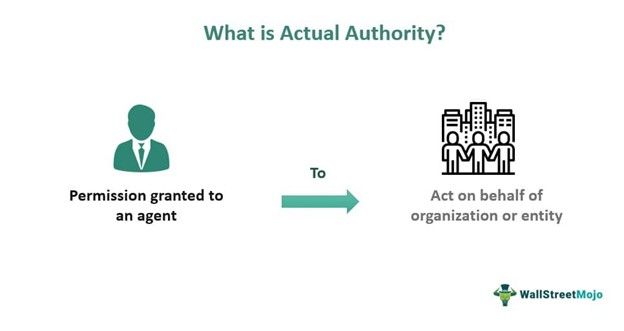Table of Contents
Key Takeaways
- Actual authority definition is when a principal grants its agent the authority to act or take specific actions on behalf of the principal.
- There are two types, expressed and implied; the latter is also called usual actual authority.
- The opposite of it is apparent authority, which is not legally binding, and the agent operates even when it is not expressed or granted by the principal.
- A written form is preferred to avoid potential legal issues in the future and serves as a proof document.
Types
The types of actual authority are -
- Expressed Actual Authority - refers to a scenario where the principal explicitly directs and tells the agent that they possess the authority to take specific actions and make decisions on behalf of the principal. It is mainly in a written document and works like a piece of evidence that the agent had the right to act on behalf of the principal.
- Implied Actual Authority - this type of authority resides with the general behavior and understanding of the principal and agent. It is called implied authority because the person's actions are parallel to the circumstances implying it. It is also referred to as usual authority. Such authority is granted to let an agent perform necessary tasks and carry out operations that the principal has explicitly expressed.
Examples
Let's understand the concept with the help of some examples.
Example #1
Suppose Sarah owns a small business and hires John as her sales manager. Sarah explicitly informs John that he has the authority to negotiate and finalize sales contracts with clients on behalf of the company. This verbal agreement constitutes expressed actual authority.
One day, John encounters a potential client interested in a long-term partnership. Without consulting Sarah, John negotiates and signs a contract with the client, agreeing to favorable terms for the company.
However, when Sarah learns of the agreement, she discovers that the terms are less beneficial for the company than she had hoped. She questions John's decision and accuses him of overstepping his authority. In response, John argues that he was acting within the bounds of his authority, as Sarah had explicitly granted him the power to negotiate and finalize sales contracts. In this hypothetical scenario, the dispute arises from the interpretation of John's actual authority as granted by Sarah.
Example #2
Imagine a property owner, Emily, who hires a property manager, Mark, to oversee the rental of her vacation home. Emily explicitly authorizes Mark to handle all aspects of renting the property, including advertising, screening tenants, and managing rental agreements. This verbal agreement establishes Mark's expressed actual authority.
One day, Mark receives a request from a potential tenant to modify the terms of their rental agreement. Without consulting Emily, Mark agrees to the tenant's requests and makes the necessary adjustments to the contract. This action falls within the scope of Mark's expressed actual authority, as he is empowered to manage rental agreements on behalf of Emily.

